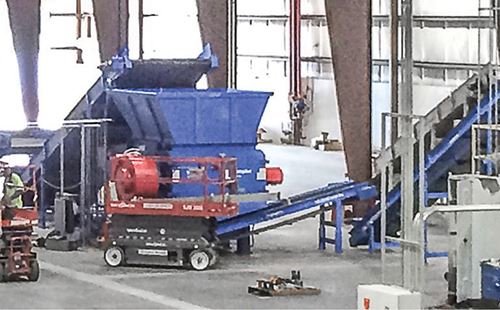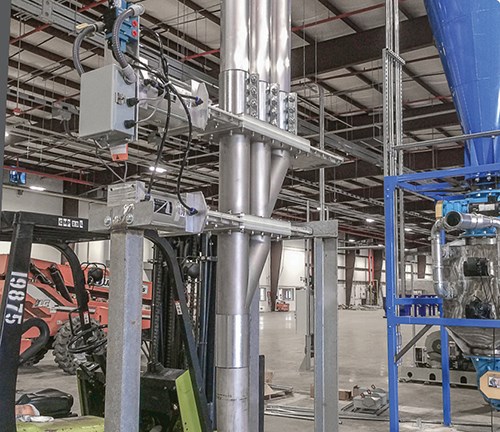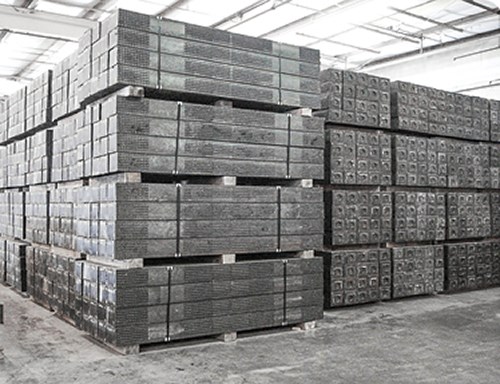Processor ‘Ties’ Business To Railroad Infrastructure
IntegriCo Composites—Webster Parish, La
IntegriCo Composites expands and adds new capabilities to produce compression molded railroad ties from recycled materials.
IntegriCo Composites is tying its business to railroad crossties. Last month, it moved from Texas to a new 170,000 ft² manufacturing facility in Springhill, Webster Parish, La. that will allow it to more than triple its production capacity. What’s more, the plant is located on a 10- acre site, allowing for further expansion.
The company (integrico.com) compression molds railroad crossties, also known as sleepers, from a proprietary blend of recycled plastics. IntegriCo’s expansion is opportunistic: Demand for rail-freight transportation is projected to double by 2035, according to the firm. Most ties are still made of wood, which requires lots of maintenance, frequent replacement, and chemicals to prevent decay.
IntegriCo says it’s the largest of only three domestic companies that make railroad ties using post-consumer plastics. And Matt McCooe, the company’s v.p. of sales and marketing, says it’s the only rail-tie supplier to offer a 10-yr warranty. Moreover, although the life span of railroad ties and crossings fluctuates, IntegriCo estimates that its products will last beyond 50 years.
Even before its recent expansion, IntegriCo had distinguished itself as unique among its competitors. While other rail ties are extruded, McCooe says IntegriCo is the only company that makes them by compression molding. But perhaps more importantly, the material IntegriCo runs is produced by its own proprietary (and patented) compounding and blending process. IntegriCo even builds its own compounding equipment.
This process allows it to compound without having to heat the material to its melting point. “We can accept some of the dirtiest material others can’t process because we can use much lower temperatures. It allows us to use much lower cost material—in fact, for some of the material we source, we are just paying shipping costs,” explains McCooe.
IntegriCo uses primarily post-consumer HDPE, though a critical component of its formulation is post-industrial cross-linked LDPE.
In Texas, the company sourced the post-consumer HDPE from various local recyclers. But the Louisiana facility is equipped with a large shredder from Vecoplan LLC, Archdale, N.C. and a grinder from Hosokawa Polymer Systems, Berlin, Conn. (polysys.com). So now IntegriCo buys large bales of HDPE directly from materials recovery facilities (MRFs) and grinds them on its own.
Initially, the company is installing enough equipment to produce 300,000 crossties/yr, but the new facility can accommodate production of up to 1 million ties/yr, so IntegriCo is looking for more material sources, notably post-consumer and post-industrial automotive scrap with high PE content. McCooe says the company expects to be buying well in excess of 50 million/lb of plastic over the next year.
IntegriCo had been producing rail ties in Temple, Tex. since 2009. When that plant reached capacity, it searched for a second facility. IntegriCo opted for Louisiana because many of the crossties it makes go into rail lines in the Southeast, according to McCooe, who also acknowledges the support it received from Louisiana Economic Development in Baton Rouge.
Related Content
-
ACS Group Adds Regional Sales Manager
Richard Gutierrez named Southwest regional sales manager.
-
Captive Molder Beefs Up Auxiliaries to Boost Quality, Consistency
SeeScan adds conveying, drying, feeding and chilling technologies to improve quality — and enhance employee safety — in production of its underground/underwater inspection systems.
-
Smart Works Cells at the Heart of Wittmann’s Exhibit
NPE2024: Under the theme of “It's All Wittmann,” the supplier of injection molding machines, automation and auxiliary equipment is hoping to show NPE attendees what comes with true connectivity.











